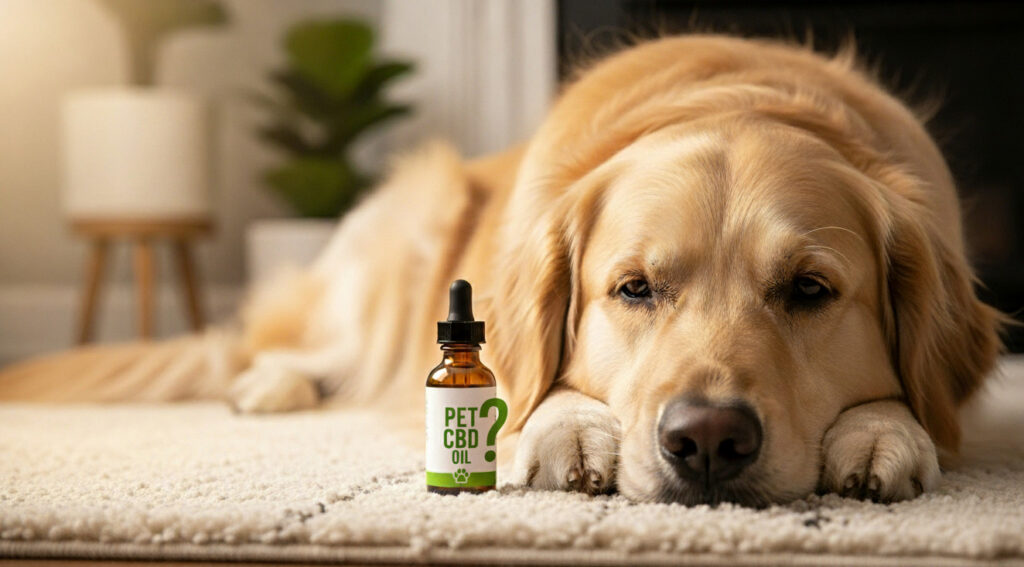If you’ve watched your dog pace during thunderstorms or seen your cat disappear when the doorbell rings, you know that pet anxiety is heartbreaking. And chances are, you’ve wondered about CBD. It’s everywhere these days – from pet stores to online forums buzzing with miracle stories.
But here’s the thing: while CBD shows some genuine promise for anxious pets, we’re still learning what really works versus what’s just hopeful thinking. After diving deep into the latest research, I want to share what science actually tells us so far.
Why Pet Anxiety Matters More Than Ever
Between 20-40% of dogs visiting veterinary behaviorists struggle with anxiety. That’s a lot of worried pups! Whether it’s separation anxiety, noise phobias, or general nervousness, traditional treatments have usually meant behavior training, environmental changes, or prescription medications.
CBD has entered the conversation as a potential game-changer. But should we believe the hype? Let’s look at what researchers have actually discovered.
CBD Basics (Without the Confusing Science Jargon)
CBD, or cannabidiol, comes from hemp plants. Unlike its cousin THC, it won’t make your pet high. What it might do is interact with something called the endocannabinoid system – basically, a network in your pet’s body that helps regulate mood, stress, and even pain perception.
Think of it like this: your pet’s body already has natural compounds similar to CBD, and adding CBD might help support this system. The key word here is “might” – because we’re still figuring out exactly how it all works in our furry friends.
What Studies Are Actually Finding
Let’s get into the research that made me sit up and pay attention.
For dogs, a 2020 study by Morris et al. examined CBD’s effects on noise-phobic dogs during fireworks. While some dogs showed improvement in their fear responses, the study lacked a placebo control group, making it hard to rule out the ‘hopeful pet parent’ effect.
Colorado State University did things right with a proper controlled study in 2021. They found that CBD actually lowered stress hormones in dogs before anxiety-triggering events. The interesting part? Not every dog responded the same way. Some showed dramatic improvement, while others… not so much.
Research on CBD for cats remains extremely limited. A 2019 study examined CBD pharmacokinetics and safety in cats, but we still lack robust studies specifically on CBD for feline anxiety.
The Knowledge Gaps That Keep Me Up at Night
Here’s what drives me a little crazy as someone who wants the best for pets: we still don’t know some pretty crucial things.
Nobody can tell you the perfect dose for your specific pet. We don’t have solid long-term safety data beyond about a year. We’re not sure why some pets respond beautifully while others don’t respond at all. And perhaps most concerning – we don’t fully understand how CBD might interact with other medications your pet might be taking.
Real Talk About Safety
From the studies we do have, most pets tolerate CBD well, but some experience:
- Drowsiness (might actually be a plus for anxious pets!)
- Mild stomach upset initially
- Increased thirst
- In rare cases, elevated liver enzymes
The medication interaction issue is serious. CBD can affect how the liver processes certain drugs, potentially making them stronger or weaker. If your pet takes any regular medications, this is definitely a conversation to have with your vet.
Navigating the Legal Maze
Here’s where things get murky. The FDA hasn’t approved CBD for treating pet anxiety. It’s sold as a supplement, which means it doesn’t go through the rigorous testing that pharmaceuticals do.
Your state might have its own rules too. Some veterinarians can’t legally recommend CBD even if they think it might help. It’s frustrating when you just want to help your anxious pet, but these regulations exist for safety reasons.
Finding Quality Products (If You Decide to Try)
After all this research, if you and your vet decide to explore CBD, here’s what to look for:
The non-negotiables:
- Third-party lab results (called a Certificate of Analysis or COA)
- Clear labeling showing exact CBD content in milligrams
- Pet-specific formulation (human CBD often contains things toxic to pets)
- CO2 extraction method (the cleanest option)
Run away from products that:
- Promise to cure anxiety or any other condition
- Won’t share their lab results
- Seem suspiciously cheap
- Contain a mystery blend of supplements
Smart Questions for Your Vet Visit
Before jumping into CBD, here’s what to discuss:
“Is my pet’s anxiety properly diagnosed?” Sometimes medical issues masquerade as anxiety.
“What else should we try first or alongside CBD?” Anxiety usually needs a multi-pronged approach.
“Could CBD interfere with my pet’s other medications?” This is crucial for pets already on meds.
“How will we know if it’s working?” Setting measurable goals helps track real progress versus wishful thinking.
Let’s Get Real About Expectations
Quality CBD products typically run $30-100+ monthly depending on your pet’s size. That adds up quickly, especially since pet insurance rarely covers it.
If CBD is going to help your pet, you’ll usually see changes within 2-4 weeks. No improvement by then? It might not be your pet’s solution, and that’s okay.
My Take After All This Research
The emerging science on CBD for pet anxiety is genuinely intriguing, but we’re not at the “miracle cure” stage some claim. What we have is a potentially useful tool that might help some pets as part of a bigger anxiety management strategy.
Some pets seem to respond wonderfully. Others don’t respond at all. We don’t yet know how to predict which camp your pet will fall into.
The most responsible path forward? Work with a veterinarian who stays current on CBD research. If you try it together, treat it like a careful experiment – monitor closely, keep notes, and be honest about what you’re seeing.
The Bottom Line
Pet anxiety is real, it’s tough on everyone involved, and it deserves serious attention. Whether the answer includes CBD, traditional medications, behavior modification, or all of the above, what matters is finding what helps your individual pet.
The research continues to evolve rapidly. What we know today will probably seem primitive compared to what we’ll understand in five years. For now, stay curious but cautious, work with professionals you trust, and remember – you know your pet better than anyone.
Keep advocating for your anxious pet. The fact that you’re researching options shows you’re already on the right track. And honestly? That dedication to your pet’s wellbeing is more powerful than any supplement will ever be.
⚠️ Disclaimer
Always consult your veterinarian before starting any new supplement, including CBD. This article shares research findings for educational purposes and isn’t medical advice.
Studies Mentioned:
- Hunt, A.B.G. et al. (2023). “A single dose of cannabidiol (CBD) positively influences measures of stress in dogs during separation and car travel.” Frontiers in Veterinary Science, 10.
- Morris, E.M. et al. (2020). “The Impact of Feeding Cannabidiol (CBD) Containing Treats on Canine Response to a Noise-Induced Fear Response Test.” Journal of the American Holistic Veterinary Medical Association, 60.
- Corsetti, S. et al. (2021). “Cannabis sativa L. may reduce aggressive behaviour towards humans in shelter dogs.” Scientific Reports, 11(1).
- Deabold, K.A. et al. (2019). “Single-Dose Pharmacokinetics and Preliminary Safety Assessment of Cannabidiol in Cats.” Journal of Feline Medicine and Surgery, 21(6).
- Bartner, L.R. et al. (2018). “Pharmacokinetics of cannabidiol administered by 3 delivery methods at 2 different dosages to healthy dogs.” Canadian Journal of Veterinary Research, 82(3).
- Vaughn, D. et al. (2021). “Randomized, placebo-controlled, cross-over study of cannabidiol as an adjunctive treatment for canine osteoarthritis pain.” Journal of Veterinary Internal Medicine, 35(3).

